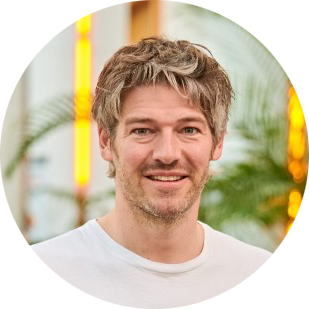OneUp provides innovation strategies to the food industry
Mark Dijksman is the founder and CEO of oneUp. The name refers to a video game: in Super Mario Bros, you earn 1Up (an extra life) when you jump on a green mushroom. Dijksman and his team provide this extra life force to companies in various industries, including fashion and food, by helping them innovate.
According to his experience, companies often have ideas for innovation but lack the structure to implement them. That’s why he and his team provide “innovation ventures” – organizations that work closely with companies to generate and develop ideas until the company is ready to embrace and implement them. New technologies, such as Blockchain and artificial intelligence, naturally play a role in this process.
Future Strategy
“Of the roughly 45 people working for oneUp, 70 percent are venture employees. However, in recent years, we’ve been receiving more inquiries about business strategies. Should I invest that euro in the company or in innovation? That’s why we also have a number of employees dedicated to developing strategies. For example, we can help a client determine their future strategy. What challenges lie ahead, and what are the new business models?”
Beanbag
In his experience, companies now view innovation differently in the current market. “Five or six years ago, innovation was somewhat theatrical. People were thinking more outside the box, but at the same time, if you had a beanbag and a foosball table, you were considered innovative. Now, innovation is more about whether growth can be achieved in the current market. The means to do so are still there. Innovation can happen in two ways: by opting for an offensive or defensive approach.”
New Concept
He gives an example based on a case from one of their clients, a large clothing brand. “This company wants to focus on sustainability in the coming years. Part of that is ensuring that clothing is worn again and still making money from it. Did you know that we only wear about 50 percent of our clothing once a year or less? We’ve developed a model based on someone’s wardrobe. An ID is created for each clothing item. Customers can be assisted in various ways through an app, such as outfit combinations and purchase tips – is it wise to buy a fourth yellow shirt, or would you be better off choosing a new pair of pants? Unused clothing items can be sold through Vinted, and for items that need repair, you can make an appointment with a tailor. Such an app introduces several new business models. For example, customers may have to pay for the app. It’s an offensive way of growth, focusing on a new concept.”
3D Modelling
He also provides a ‘defensive’ example, also for a client in the fashion industry. “In this case, you can, for example, look at how certain assets of a company can be better utilized. In this case, the use of 3D modelling. We have provided the company with ideas on how they can use this technique in more areas, such as for sales and marketing. Thanks to 3D modelling, characters in games can, for example, wear certain clothing items. This is a new way of generating business.”
Generative AI
Various techniques fall under artificial intelligence, including generative AI (Gen AI), explains Dijksman. “For example, texts and images are generated using this technique. This technology sheds new light on various aspects. You can, for example, start thinking about marketing expenses. How can the use of AI help save on this front? We have, for example, used AI in a case for a staffing agency. Their goal is to find the best possible candidate for a position as quickly as possible. We were able to greatly accelerate this process. If you’re starting a new company, you almost can’t avoid AI anymore. If you have a defensive strategy, it doesn’t make sense to just slap AI on it. You first need to clarify your problem, and then see if you can use AI or Gen AI.”
Personalized advice
oneUp also has a number of clients in the food industry. So he is familiar with the sector. “In the field of AI, we see quite a lot happening. For example, it is used in the protein transition. Gen AI is even less applied. In the future, this could, for example, contribute to more personalized nutritional advice, just to give an example.”
Dijksman will provide more examples during his lecture on March 14th at the IFFI Event ‘Artificial Intelligence in Commerce’.
More info on www.oneup.company

Mark Dijksman
